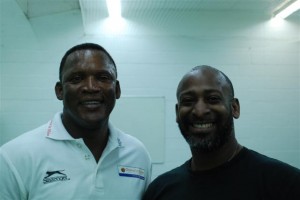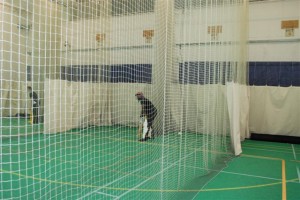 The first of June. One of those beautiful early sunny days made even brighter by the presence one of cricket’s sporting heroes – and undoubtedly England’s best fast bowler of the 20th century – Devon Malcolm.
The first of June. One of those beautiful early sunny days made even brighter by the presence one of cricket’s sporting heroes – and undoubtedly England’s best fast bowler of the 20th century – Devon Malcolm.
After a kind and warm welcome from the Oval’s people and even nicer PR, my first glimpse of nice guy Devon Malcolm saw him launching his trade mark fast bowling bombs at a brave man in a lion’s outfit. Yes, you read correctly. Not something you get to do every day, granted, but I thought I’d stick to the conventional padding when it came to my nerve-jangling turn.
The whole day was to promote Fire in Babylon, a DVD out on 6th June, about the unstoppable cricketing force that was the West Indies team in the 70s and 80s. For nigh on two decades, the Windies blew everyone away and dominated the world of cricket like no other team. Their skill, talent, genuine passion and team spirit has rarely been rivalled.
Devon Eugene Malcolm was born on 22 February 1963 in Kingston, Jamaica. Ironically, he settled and played for England and became one of his adopted country’s best-ever fast bowlers. While the man himself would admit that his batting skills at the crease left a lot to be desired, his bowling made him globally known, feared and revered by the opposition.
For all those who are good at arithmetic, you’ll notice that Devon is 48 years old. But having faced the fast balls and the REALLY fast balls from Devon, it’s clear that he is not only in amazing form, but in exceptional shape for someone who was in first-class cricket for almost 20 years without injury hampering his lifestyle and throwing arm – a fact he is clearly thankful for. Whether those at the other end, like me, felt the same way in those seconds before he lets fly with a grenade-like delivery remained unsaid.
After receiving the blurring missiles from him at the crease (and even splitting my trousers dodging a super fast ball) I was grateful for the experience of few minutes in his company for a calmer interview.
Errol Clarke: How does it feel being part of the historic era that really made cricket?
Devon Malcolm: Although it was a great privilege and honour to play for England, my early influences were totally around that iconic West Indian side. I’m talking about the 60s, 70s and 80s. Most guys in my era, at any age, played cricket. I don’t care where you come from! If you were from Australia, New Zealand, England, whatever, they have to be influenced by that West Indian side. So much so, that one of my heroes was Michael Holding. You’ve got guys like Colin Croft, Malcolm Marshall and guys like that! I was just a young boy growing up in Jamaica and the commentator was talking about Michael Holding taking a long run up to bowl. I didn’t even know what he looked like then, but I used to make a massive run up and ran faster than I used to bowl – and then eventually I learned HOW to bowl. Those guys were a massive influence in the 70s and even before that.
EC: Well, you almost had 20 years at first class cricket, were you not tempted to hit that magic 20?
DM: I had almost 20 years as a first class cricketer and I have played as an international, but to play as a fast bowler for that long without any major injuries is a blessing! I had a good lifestyle and was pretty strong and I am glad to have such a career that I could be asked back today and be able to still turn my arm over – and I am almost 50! And to be honest if you look at guys who have played the amount of international cricket, or first-class cricket that I have, they are pretty sore in the knee and their back and they may not even be fast bowlers. It’s hard work fast bowling! A very, very tough world.! I mean, man, fast bowling is a key part of cricket and a beautiful thing if you’re watching it – and terrifying if you’re in front of it.
EC: I can speak from first hand of it from today’s experience.
DM: You’re a brave man, a brave man. (Both laugh).
EC: Did you know that before you retired that you had THE best fast bowling analysis of the 20th century?
DM (smiling broadly) : Yeah, to be honest, I remember the day and we were playing the game against South Africa here in ’94 and walking off the field after taking 9 for 57. I remember the England captain, Michael Atherton, said: “Dev, do you realise what you’ve just done?” I said: “Every time I go out to play for England, or play cricket, I want to take all ten wickets!” and he replied: “Maybe so, but we will probably never see again one person dominate cricket again at this level!” And I said to him, “I tell you what. If you want it to mean something, then you guys go out and get the 140 runs we need to win the game.” And we went on to win and got the runs. Then it really meant something and the record still stands.
EC: The sixth best innings in bowling history.
DM: It’s only been done once and I call myself a quick bowler. You have your medium paced bowler and your spinners, but if you want to categorize then I am the only fast bowler to have done it. I have a video at home of Michael Holding bowling in 1976 against England. He was my hero, and watching him take England apart and then to come to the Oval and do the same to South Africa in the same place, it is almost as though it was written in the script for me to come and it’s unbelievable.
EC: You mentioned South Africa which has to be THE iconic match ever for you really.
DM: Indeed and doing a game like that against South Africa who had just come back into international cricket, all of a sudden I am getting calls from President Nelson Mandela, Bishop Desmond Tutu and that was after I had bowled their guys out! I was invited to Downing Street and met the President for lunch and stuff like that. It was a massive thing to do – and it was great!
EC: And tell me about Fire in Babylon.
DM: As we were talking about the iconic West Indies side, Fire in Babylon is a documentary about how they dominated the game for decades and are probably one of the best teams ever. It’s the history behind it all. It’s not something just to keep on the shelf, it’s something you buy to watch, I mean from an educational point of view. Show the kids, because probably a lot of kids playing now, even in the Caribbean, don’t realise where West Indian cricket is coming from. The camaraderie and the history behind it. The West Indies is made up of many islands and the binding force behind them as well.
EC: It is almost like a mantle to pass to the next generation.
DM: Indeed. So I think it would benefit youngsters, even in schools as part of the curriculum!
EC: That would be great, as you don’t see that sort of thing, where they learn from video analysis for sports. This shows the ‘why’, ‘where’, ‘and ‘how’ plus the team spirit and how they got together.
DM: Cricket is a great sport and a very successful one.
EC: If I could ask one last question before they pull you away to do some more bowling. The statement, ‘you guys are history’ and you obviously have a book of the same title as well. Did you ever think coming from where you were, as a youth growing up that you’d create history, write a book and BE in the history books as the best fast bowler of the 20th century? It’s an accolade to go from a boy in Jamaica to representing your adopted country and become a hero of the sport in people’s eyes. How does it all feel?
DM: It’s a great feeling, to have the opportunity to play cricket here and my first tour was back in Jamaica, land of my birth. They adopted me back straight away and cheered for me when I went out to play. I wanted West Indies to do well, but also wanted England to do well and it was a dream come true!
When I was at school in Jamaica, part of my learning to read was ‘Calypso Comes to Lord’s’. I used to read it and be dreaming and dreaming. And the picture I painted of Lord’s was even more vivid than it is right now. So to get the opportunity to come and play for England and play at Lord’s was a massive dream come true! It’s quite amazing. Those that influenced me played at Lord’s and here and to meet my heroes and to play against some of them as well is massive. I played with quite a few of them and I feel worthy. No job in the world would have given me the opportunity to have and do what I have done and I have no regrets at all.
Hopefully, I can promote the game and give youngsters every chance to shine and to promote Britain and get cricket back into schools. Hopefully, I will be able to get across to some of the black boys and get them playing cricket and onto the team like I did.
EC: Thank you for your time today and good luck with everything. All the best for the future.
Devon was then whisked away for more reporters to be terrorised by the youthful fast bowler in the green of the Oval. Meanwhile, I left with my body intact and a pleasant feeling after an interview with a man who was the greatest fast bowler England has ever had, but who remains, criminally, yet to be rewarded for his services to sport. Hopefully, if they do a sequel to Fire in Babylon, Devon Malcolm would have been not only rewarded by then, but featuring in the DVD too.
Fire in Babylon is released on the 6th of June.






